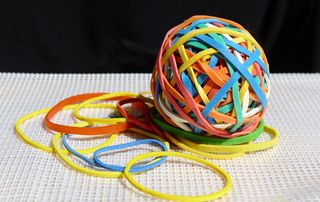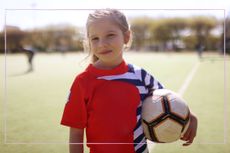'I tried the rubber band parenting method to make me a more mindful mum'


With so many parenting techniques and so little time I needed a painless win-win approach that gave quick results…
I’ve always viewed parenting techniques with skepticism and a ‘damned if you do damned if you don’t’ attitude. Like most parents I muddle through, experiencing a daily array of emotions from tremendous love to angina-inducing frustration.
When my child is angry or has tantrum I blame myself. Has he had too much attention? Not enough? Should I have watched him floss for the gazillionth time instead of checking work emails? ‘He’s just a kid,’ I tell myself as my delightful offspring stomps up the stairs shouting that he hates me, but I still feel like I'm failing.
But, after another morning rushing to school flustered and fractious because I couldn’t get him out of the door on time despite numerous promptings, I think it’s time for this old dog to pick up some new tricks.
I’m averse to defining parenting by a single technique and finding the time to read a whole book on one is as overwhelming as converting to Catholicism or following the Keto Diet. But the praise-based rubber band technique, which involves a parent wearing three ‘good behaviour’ rubber bands, sounds simple and effective.
How does the rubber band parenting method work?
Every day, each time there’s a reason to praise your child, move a band from one of your wrists to the other. The aim is to have moved all three bands by bedtime. I know my left from right, which is a good start, and it sounds manageable enough. I’m sold.
But there are no rubber bands in the house because my son has used them to make a ball for our two kittens to play with, which has got lost in the greasy wilderness behind the oven. So I scrabble about to find three hairbands then immediately and unintentionally criticise him:
GoodtoKnow Newsletter
Parenting advice, hot topics, best buys and family finance tips delivered straight to your inbox.
‘What’s wrong with the dozen toys we bought from Pets At Home?’
Then I clock the bands…
‘But! What a great idea to use the rubber bands for something other than what rubber bands are used for. That’s very inventive,’ I say.
‘Yeah,’ he says and his face lights up. We hug.
‘Mum?’
‘Yes, love?’
‘Can you get me some more online? And while you’re there can I have a staple gun and some Pokemon cards?’
Ah, there it is.
‘No,’ I say with a fake smile. ‘You are seven so you may not play with a staple gun,’ but I move a band to my left wrist because I praised him and he accepted that praise even if he did push his luck by trying to fill my Amazon basket.
The same day I ask him to empty the dishwasher. My son knows we’re playing the rubber band ‘game’ and I’m expecting the novelty to wear off but not only does he complete the task, he loads the machine as well.
‘Wow,’ I say genuinely impressed (and slightly taken aback). ‘Thanks. That’s very helpful.’
This is a grand gesture of cooperation on his part but it’s the unseen gestures I’m particularly keen to spot, so when I overhear him thank his cousin for passing a box of Lego I dart through to the lounge exclaiming, ‘I heard that! And you weren’t even after a band because I wasn’t in the room. Well done for being polite.’ The three bands have made it to my left wrist and my son looks genuinely happy.

The next day I ask him what ways he thinks he can get the three bands from my right wrist to my left. ‘It’s like a magic trick,’ I say. ‘The bands only move if you do good things and you have to decide what those good things are.’ To my surprise he doesn’t forget: he feeds the kittens; offers ice pops to his friends before taking one for himself; and puts his light out before being asked.
He also tells me my homemade bolognese tastes icky and pushes it away as if I’ve tried to poison him; gets upset by the very mention of homework; and refuses to get in the bath, but the three bands have made it to my other wrist and my son has visible results to show he’s been good enough that day.
What I learnt from the rubber band parenting method
Like many tired, multitasking parents I tend to zone in on the negative behaviour rather than the positive – probably because kids are constantly learning and we are constantly teaching so there’s more room for error. What’s valuable about the rubber band method is that not only is it about improving a child’s behaviour quickly and clearly, it’s about refining our own by becoming more mindful of what children achieve every day, things we adults have forgotten are mini milestones.
It certainly challenged my default position – that of being on the defensive and easily annoyed. It can take two or three attempts to get a reaction or answer out of a busy partner or distracted colleague so how can we always expect a response the first time from our kids?
It’s also about finding something affirming in a child’s conduct, however small, including things that are half-right, such as getting ready for bed even if they forgot to brush their teeth. Or doing something quicker, even if it’s not as quickly as we’d like, such as putting on their shoes the second time they’re asked rather than the third (or fourth, or fifth).
It dawns on me that when my child did something good around the house without being badgered or bribed I never made as big a deal of it as when he misbehaved or was uncooperative. Instead, I carried on with a sigh of relief because I didn't need to stop, correct, plead or shout. Getting the bands from one wrist to another has been as much about me spotting that imbalance as it has been about encouraging good acts from my son.
I’m not wearing the bands now but we regularly hit our three-praise target a day and, as a treat, my son got some Pokemon cards. The staple gun, however, will have to wait.

Debra Waters is an experienced online editor and parenting writer. She also has a strong background on health, wellbeing, beauty, and food. She currently writes for Goodto and Woman&Home, and print publications Woman, Woman’s Own, and Woman’s Weekly. Debra has written for What to Expect, Everyday Health, and Time Out. In addition, she has had articles published in The Telegraph and The Big Issue.
-
 Worried about your teen 'being smelly'? They can't help it, according to scientists, and help is on its way to ease the problem
Worried about your teen 'being smelly'? They can't help it, according to scientists, and help is on its way to ease the problemWe know that puberty can cause all sorts of smells to emanate from teens - now scientists have revealed exactly what you're smelling, and how evolution contributed.
By Lucy Wigley Published
-
 Parenting coach shares 4 'powerful' reframes to try next time it feels like your kid is pushing all your buttons (and #4 is a game changer)
Parenting coach shares 4 'powerful' reframes to try next time it feels like your kid is pushing all your buttons (and #4 is a game changer)A parenting coach has shared four ways parents can reframe their thoughts when their kid has big emotions. Giving them a try could offer big results in little time.
By Lucy Wigley Published
-
 What is ‘sturdy parenting’? Child psychologist Dr Becky explains the benefits of this technique
What is ‘sturdy parenting’? Child psychologist Dr Becky explains the benefits of this techniqueIf you're at a loss when it comes to disciplining your kids, sturdy parenting might help - and it's approved by child psychologist Dr Becky.
By Ellie Hutchings Published
-
 3 tips to set screen time boundaries from parenting experts Dr Becky Kennedy and Professor Emily Oster - and #1 is an important reminder
3 tips to set screen time boundaries from parenting experts Dr Becky Kennedy and Professor Emily Oster - and #1 is an important reminderStruggling to set screen time boundaries with your kids? Parenting experts Dr Becky Kennedy and Professor Emily Oster have shared three top tips.
By Ellie Hutchings Published
-
 Could 'lazy parenting' be the next big thing? 2 psychologists share why it can be beneficial for development, but not everyone agrees
Could 'lazy parenting' be the next big thing? 2 psychologists share why it can be beneficial for development, but not everyone agrees'We need more lazy parents' and here's why, according to two child psychologists
By Ellie Hutchings Published
-
 Parents, do you know what H.E.L.P. stands for? Psychologists swear by this acronym to navigate those tough parenting moments we all face
Parents, do you know what H.E.L.P. stands for? Psychologists swear by this acronym to navigate those tough parenting moments we all faceRemember: Halt, Empathy, Limits, Proximity...
By Ellie Hutchings Published
-
 Sticker charts 'don't work in the long run' says psychotherapist - try these 8 tips to teach kids intrinsic motivation instead
Sticker charts 'don't work in the long run' says psychotherapist - try these 8 tips to teach kids intrinsic motivation insteadOne expert has explained eight things you can do as a parent to help your child develop intrinsic motivation - and it means abandoning the sticker chart.
By Ellie Hutchings Published
-
 Reflective parenting could help your teenager manage their big emotions, new research shows - here are 5 steps to try
Reflective parenting could help your teenager manage their big emotions, new research shows - here are 5 steps to tryThe teenage years are tough for everyone involved. But research has suggested that an approach known as 'reflective parenting' can be the key to reconnecting.
By Ellie Hutchings Published
-
 These 5 'game changing' phrases can teach your children about the mental load, according to a psychologist - and it could set them in good stead for adulthood
These 5 'game changing' phrases can teach your children about the mental load, according to a psychologist - and it could set them in good stead for adulthood"Change at home can change society"
By Ellie Hutchings Published
-
 'You can quit... but not today' - the game-changing words to use when your kid wants to give up a sport, according to an Olympic gold medallist
'You can quit... but not today' - the game-changing words to use when your kid wants to give up a sport, according to an Olympic gold medallistOlympic gymnast Nastia Liukin has shared the words her parents told her whenever she wanted to quit - and you can use them too.
By Ellie Hutchings Published